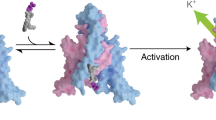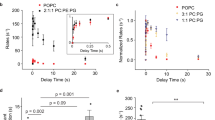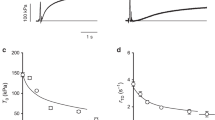Abstract
LEUCOCIDIN is a product of Staphylococcus, consists of two proteins and is toxic to the polymorphonuclear leucocytes of rabbit and man. The study of the response of leucocytes to leucocidin has led to the unexpected finding that the changes that occur mimic those in excitable or secreting cells during membrane depolarization or stimulation by hormones1. Thus the permeability to cations but not other small molecules increases, protein in the cytoplasmic particles is secreted and calcium is accumulated in vesicles. It is probable that the primary response to leucocidin is the increased permeability to cations1. The changes in membrane structure that precede the altered cation permeability during membrane depolarization are unknown and the mode of action of leucocidin may be relevant. The study of the interaction of leucocidin with the isolated leucocyte membrane and with purified phospholipids led us to suggest that the primary action of leucocidin is to change the conformation of triphospho-inositide in the leucocyte surface membrane. This communication provides confirmatory evidence for this hypothesis.
This is a preview of subscription content, access via your institution
Access options
Subscribe to this journal
Receive 51 print issues and online access
$199.00 per year
only $3.90 per issue
Buy this article
- Purchase on Springer Link
- Instant access to full article PDF
Prices may be subject to local taxes which are calculated during checkout
Similar content being viewed by others
References
Woodin, A. M., in The Biological Basis of Medicine (edit. by Bittar, E.), 2 (Academic Press, New York, in the press).
Woodin, A. M., and Wieneke, A. A., Biochem. J., 105, 1029 (1967).
Dawson, R. M. C., and Eichberg, J., Biochem. J., 96, 634 (1965).
Wieneke, A. A., and Woodin, A. M., Biochem. J., 105, 1039 (1967).
Hendrickson, H. S., and Ballou, C. E., J. Biol. Chem., 239, 1369 (1964).
Grado, C., and Ballou, C. E., J. Biol. Chem., 236, 54 (1961).
Hörhammer, L., Wagner, H., and Richter, G., Biochem. J., 331, 155 (1959).
Brown, D. M., Hall, G. E., and Letters, R., J. Chem. Soc., 3547 (1959).
Eichberg, J., and Dawson, R. M. C., Biochem. J., 96, 644 (1965).
Brockerhoff, H., and Ballou, C. E., J. Biol. Chem., 236, 1907 (1961).
Elsbach, P., and Schwartz, I. L., J. Gen. Physiol., 42, 883 (1959).
Hille, B., J. Gen. Physiol., 50, 1287 (1967).
Sheltawy, A., and Dawson, R. M. C., Biochem. J., 100, 12 (1966).
Mueller, P., and Rudin, D. O., Nature, 217, 713 (1968).
Woodin, A. M., and Wieneke, A. A., Biochem. J., 87, 487 (1963).
Author information
Authors and Affiliations
Rights and permissions
About this article
Cite this article
WOODIN, A., WIENEKE, A. Role of Leucocidin and Triphospho-inositide in the Control of Potassium Permeability. Nature 220, 283–286 (1968). https://doi.org/10.1038/220283a0
Received:
Revised:
Issue Date:
DOI: https://doi.org/10.1038/220283a0
This article is cited by
-
Cation distributions and the energy status of cells
Journal of Bioenergetics (1970)
Comments
By submitting a comment you agree to abide by our Terms and Community Guidelines. If you find something abusive or that does not comply with our terms or guidelines please flag it as inappropriate.



